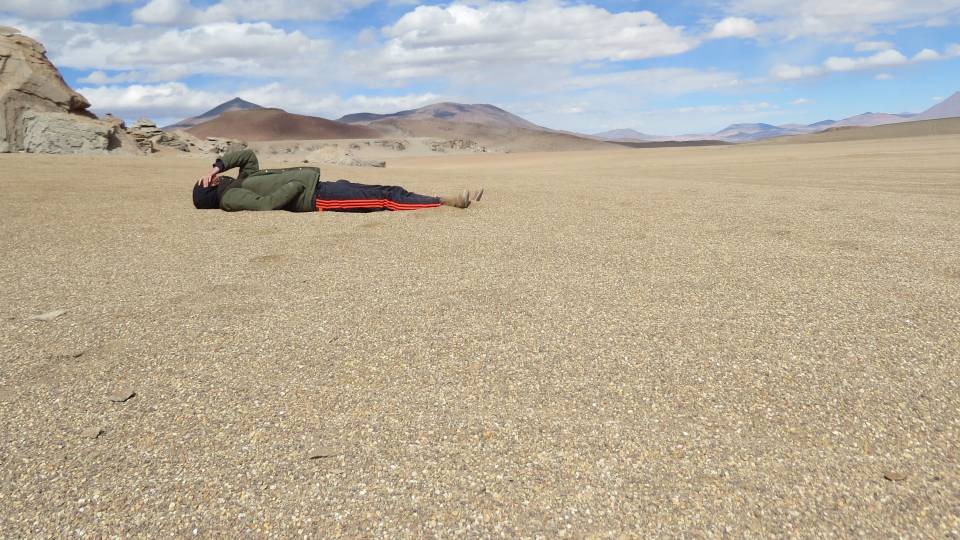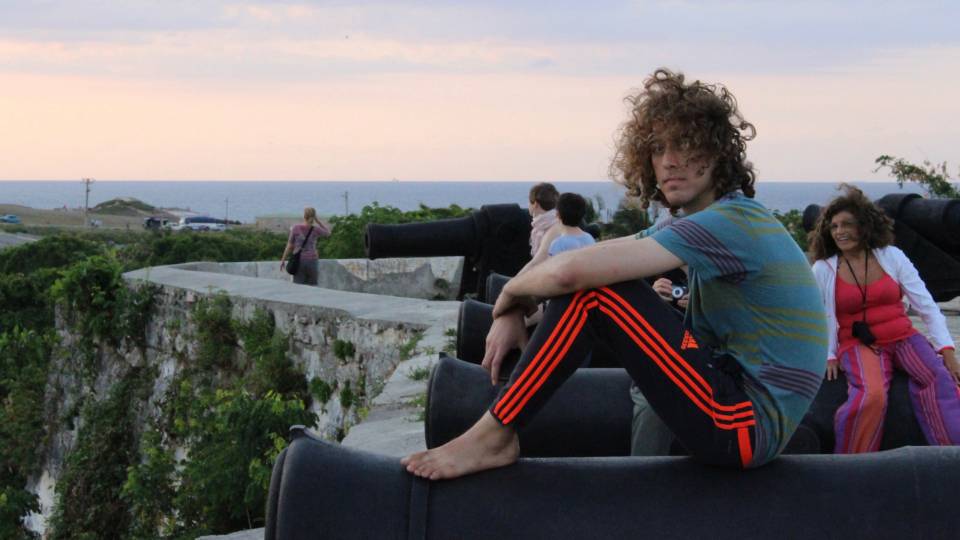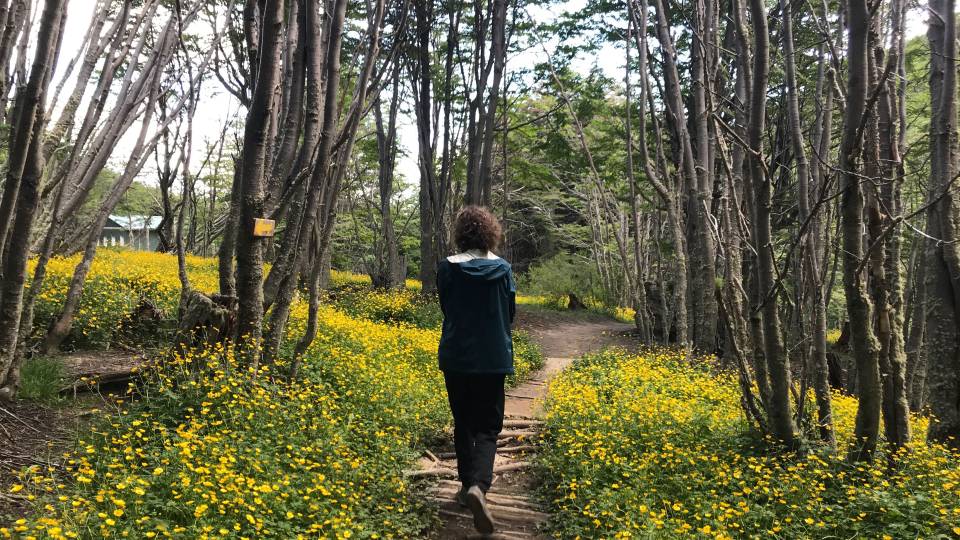Kyle Berlin
On Oct. 28, 2014, during Kyle Berlin's first semester at Princeton, the Dalai Lama came to speak at the University.
During a Q&A with a group of other students, Berlin asked: "Your Holiness, I wonder how you respond to people ... who seem to have no interest in service or in governing their lives by compassion. How do you get through to someone who is immersed in a world of antagonism and competition and drive or something like that?"
The Dalai Lama said: "I've been thinking about this for 70 years. I've learned that creating rules and making arguments do not really work. All we can do is develop our hearts, be compassionate ourselves and hope it will spark others."
Berlin's journey at Princeton has reflected this advice. His commitment to service, his exploration of the creative process and his academic achievements have taken the Princeton senior to the top of his class. Berlin, who is concentrating in Spanish and Portuguese languages and cultures and is pursuing certificates in creative writing, Latin American studies and theater, is the valedictorian of the Class of 2018. He will deliver an address at the University's Commencement ceremony on June 5.
A member of Rockefeller College, Berlin was awarded the George B. Wood Legacy Junior Prize in 2017, the Freshman First Honor Prize in 2015 and the Shapiro Prize for Academic Excellence in 2014-15.
Cultivating an ethos of 'deep listening'
"One of the most important things I can do while I'm here is to 'be here' in relation to other people with a compassionate listening ear," Berlin said.
Berlin participated in the University’s Bridge Year Program — engaged in service in Peru — before starting his academic program on campus. As a first-year student, he was overwhelmed by the sheer volume of offerings — activities, events, student organizations. "I have the blessing and the curse of being drawn to all of those things, almost obsessively," he said. What helped him was befriending a group of seniors "who had created a kind of commune" in Spelman Hall by keeping the doors of their two suites wide open. Listening the way good friends do, Berlin said they helped him see that "there is no 'right way' to do Princeton."
Inspired to do the same, Berlin served as a residential college adviser at Rockefeller College his junior year and much of his senior year.
"Just being there to listen to what [first-year students] are doing and what they're going through and then to, if I'm able, respond with some sort of reflection, is rewarding," he said.
He believes the act of listening well "cuts through to the core of what I think is important about being here or about being anywhere — which is having this interpersonal relationship, and I say relationship very deliberately, meaning two sides that have an ethical relationship to each other. This lays the groundwork for the larger societal work that we have to do in terms of making a place where everyone feels comfortable and included," he said.
One avenue among many Berlin has found on campus for "deep listening" has been the Office of Religious Life (ORL). Even though he does not consider himself a particularly religious person, Berlin said he has been drawn to ORL throughout his four years at Princeton "because of the kind of 'big picture' conversations that happen there." Recently, he represented ORL as a senior student leader at a leadership workshop for sophomores, organized by the Office of the Dean of Undergraduate Students and the Office of International Programs.

Berlin with (left to right) Preston Evers, Class of 2019; Gabriela Oseguera Serra, Class of 2020; and Alaa Ragab, Class of 2020, during the leadership workshop “Envisioning Your Leadership Path: A Collaborative Retreat for Sophomores” sponsored by the Office of the Dean of Undergraduate Students and Office of International Programs.
Setting the stage
Berlin has also listened closely and compassionately to create original theater work.
In summer 2017, with a Davis Projects for Peace grant, Berlin worked with others to conduct nearly 100 interviews in his small hometown of Arroyo Grande, California, to create a theater work called “Nice Town, Normal People.” Inspired by the town's unofficial motto, the work explores contemporary definitions of "nice" and "normal." The production was presented at Princeton in February as part of Migrations, a Princeton community initiative.
After graduation, Berlin will take "Nice Town, Normal People" on the road with the nonprofit he co-founded, Rhizome Theater Company, beginning in East Blue Hill, Maine, where he will also help the village make its own interview-based show about what “home” means in these times. He also hopes to train in Theatre of the Oppressed, a type of theater-making originating in Brazil “that aims to use theater as a means of social and political change by actively involving marginalized communities to rehearse for the undoing of acts of oppression,” he said.
Berlin didn't come to Princeton interested in theater.
The first step happened during a freshman seminar he took, "The Art of Light" with Jane Cox, a renowned lighting designer and now the director of the Program in Theater in the Lewis Center for the Arts. At the end of the semester, Cox encouraged him to think about becoming involved in theater.
Berlin found himself gravitating toward academic classes that helped inform his view of theater as a vehicle for "confronting people with things that might be uncomfortable for them to hear or even information that is totally life-shaking for them," he said.
These classes included "American Jeremiad and Social Criticism," taught by Eddie Glaude Jr., the William S. Tod Professor of Religion and African American Studies; "The Artist-Citizen: Socially Engaged Art in the 21st Century," led by Katie Pearl, an Anschutz Distinguished Fellow in the Humanities Council; "Power, Pleasure, Profit: Race and Sexuality in a Global Era," taught by Anne McClintock, the A. Barton Hepburn Professor of Gender and Sexuality Studies; and "Radical Women in Latin American Art," with Javier Guerrero, assistant professor of Spanish and Portuguese.
"Kyle has an extraordinary ability to listen, which he uses to instantaneously propose original ideas, and to discuss them with intelligence, respect and sensitivity," Guerrero said.
"Giving up is not an option," Berlin said. "I feel it's important to leverage myself in a way to help the voices of those that are less often heard ... and expand the table for everyone to have a seat."

Berlin (gesturing in front of the arch) leads “Walking Histories: Race and Protest at Princeton and in Trenton,” a theatrical walking tour that examines how issues of race and protest are imprinted on Princeton’s buildings and grounds, during the Festival of the Arts at the newly opened Lewis Arts complex last fall.
Theater, outside the box
Berlin has also explored the idea of theater in unconventional spaces.
The Princeton Atelier course "Reinventing the Guided Tour" shaped his thinking about the tour as a form of performance. For the Festival of the Arts celebration of the opening of the new Lewis Arts complex in October 2017, Berlin helped develop and lead a walking tour that examined how issues of race and protest are imprinted on Princeton’s buildings and grounds.
Berlin also leads Orange Key tours of the campus for prospective students and their families, another "performance." During every tour, he shares the reasons he chose Princeton: Bridge Year, a "singular chance to live in a different country and be of service"; and the University's focus on undergraduates and access to professors.
For his senior thesis project in theater, Berlin worked with Brian Herrera, assistant professor of theater in the Lewis Center for the Arts, to create a solo piece, “The Last Lecture Before Kingdom Come: A Brief Genealogy of Sunset Studies." Berlin developed the original persona and “renowned scholar” Burl Kylen, with three performances in a lecture hall.
Herrera considers Berlin "to be among the most extraordinary creative intellects I have encountered in my nearly two-decade career of working with undergraduate performance-makers," he said.
Berlin says he is "very lucky" to have collaborated with Herrera. "He's a scholar, but he's also an artist who makes things, and most importantly for me, he is someone who is deeply committed to forging a campus and a community and a country where everyone can feel included," Berlin said.




Berlin overlooks a valley in Urubamba, Peru, during his participation in the Bridge Year program in 2013-14.
Berlin traveled to Bolivia and Chile during summer 2015 with a Sigmund Scholar travel grant. He is pictured here enjoying a moment of repose in Uyuni, Bolivia.
Berlin studied abroad with the Princeton in Cuba program in spring 2016. He is pictured here in Havana.
As part of his senior thesis research in Patagonia in spring 2018, Berlin visited Ushuaia, Argentina.
Learning outside 'quiet libraries or Gothic towers'
Among his international travels as a Princeton student, Berlin took a PIIRS Global Seminar in Namibia, taught by history professor Emmanuel Kreike in summer 2015. He traveled in South America as a Sigmund Scholar through the Program in Latin American Studies, exploring the role the arts play in defining place. In spring 2016, he spent a semester studying in Cuba.
He shared an anecdote about a particularly meaningful experience there.
"I will never forget the long, hot nights with the thick stars and thick air sitting on the seawall in Havana, listening to reggaeton music and talking about radical theorists and radical love. It is here that I was reminded that serious learning does not have to be confined to quiet libraries or Gothic towers, but can be found on the street, in conversation, in sensuous observation, virtually anywhere in the world."
In summer 2016, he traveled across Europe on a Dale Summer Award to pursue an independent project. He also traveled to Patagonia to conduct research for his senior thesis project for his Spanish and Portuguese major, and his certificates in Latin American studies and creative writing — a collection of multi-genre stories about ecology, disappearance, memory and the search for the end of the world.
"Kyle Berlin is extraordinary, in the full sense of the word," said Pedro Meira Monteiro, the Arthur W. Marks '19 Professor of Spanish and Portuguese. Berlin traveled with Monteiro to Spain and Portugal with the department's junior seminar in fall 2016 (Monteiro served as his junior paper adviser) and as part of Princeton in Portugal. He took Monteiro's "Topics in Brazilian Cultural and Social History: Sound and Sense" in fall 2017.
"A one-of-a-kind scholar and artist, [Kyle] genuinely cares about people," Monteiro said. "What guides him is a perfect combination of intelligence and understanding."
The final curtain: Finding joy
Even Berlin's Commencement speech, he acknowledges with a smile, falls into the genre of performance. And it will include joy.
This semester he is taking "How to Think with Performance: Dance and Performance Studies Theory," with Judith Hamera, professor of dance in the Lewis Center for the Arts. He said Hamera told him just a few weeks ago, "Joy itself can sometimes be a revolutionary act."
"We don't have very many moments in our life where we just take a moment to stop and celebrate ourselves, surrounded hopefully by the people who we love and who love us, and to take that moment of reflection and of joy," he said.
To prepare for his speech, Berlin will do what he's been doing for four years at Princeton: listening. He plans to talk to lots of people — seniors, parents and even community members who he has seen at events on campus during the last four years. When he steps up to the mike, it will be "as someone who's kept my eyes and ears and senses open to this place.”
"[Kyle] presses us to challenge our comfort with easy certainties and he does so with rigor and deep critical generosity," Hamera said.
"I'm going to be doing some deep listening and try to give voice to what I hear," Berlin said. "One of the most important things in performance, which is also a great life lesson, is that you have to know your audience." He hopes to "strike a happy medium, where you can challenge people to be a better version of themselves but at the same time listen for what they may have to tell you about how you can do better as well."
























